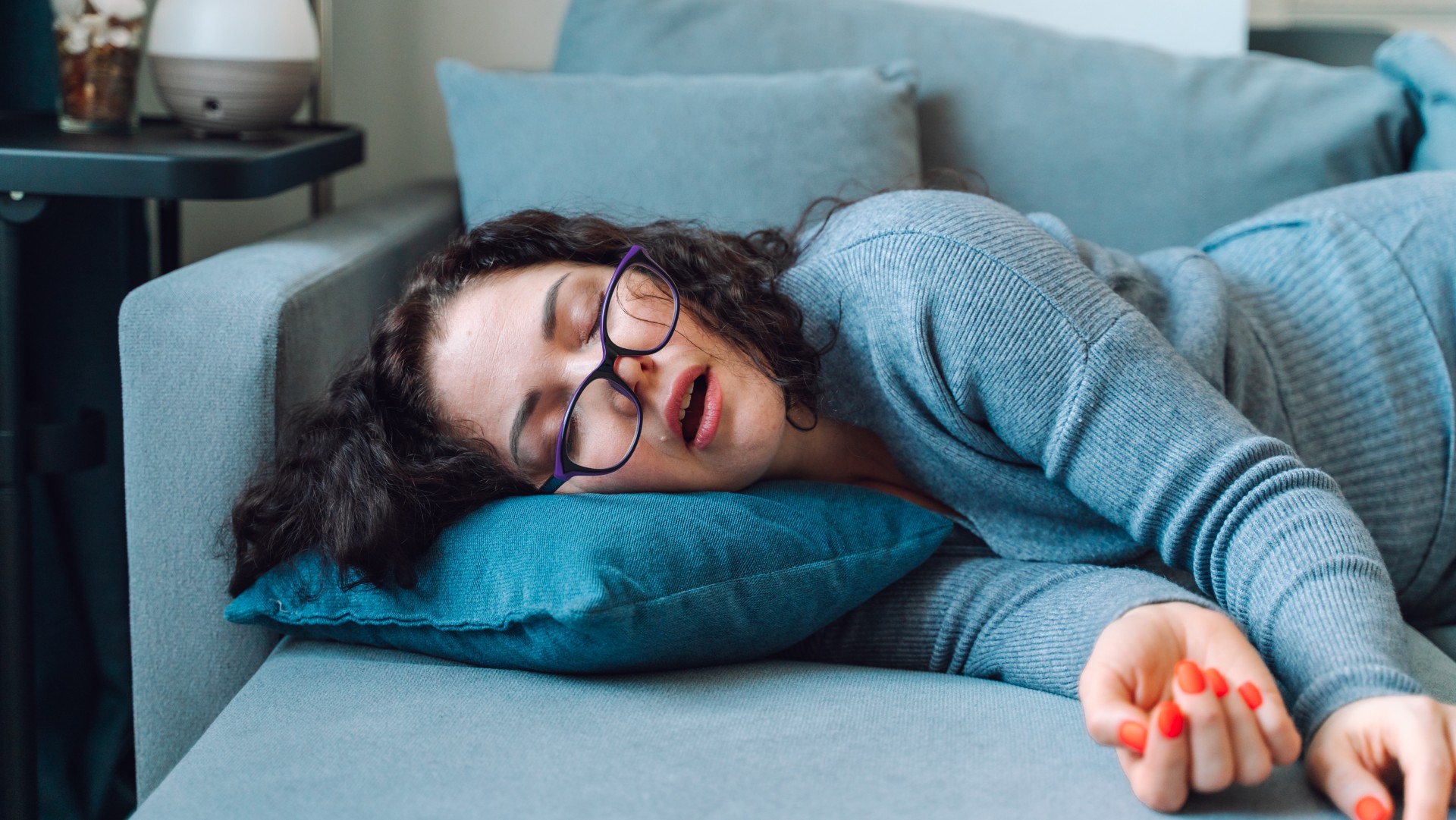Pros and cons of day-time naps
A snooze improves cognitive function and mood but sleep is also linked to obesity and underlying health issues

A free daily email with the biggest news stories of the day – and the best features from TheWeek.com
You are now subscribed
Your newsletter sign-up was successful
Take a nap or push through until bedtime? That is the question many of us ask ourselves as we wade through the fog of post-lunch fatigue.
Although Britain isn't renowned for a siesta culture, almost half of respondents to a new survey said they took a short nap "most days". The survey, commissioned by metabolism app Lingo and conducted by Perspectus Global, found that Britons take an average of four naps in a working week, lasting 53 minutes on average.
But scientists, like tired workers, are divided over napping. Large studies have suggested both benefits and harms on a population level, said Harvard Health Publishing, making it "difficult" to draw conclusions on the personal level.
The Week
Escape your echo chamber. Get the facts behind the news, plus analysis from multiple perspectives.

Sign up for The Week's Free Newsletters
From our morning news briefing to a weekly Good News Newsletter, get the best of The Week delivered directly to your inbox.
From our morning news briefing to a weekly Good News Newsletter, get the best of The Week delivered directly to your inbox.
The benefits can "vary among individuals", according to SleepFoundation.org, and can be determined by "knowing the facts".
The Week weighs up the pros and cons.
Pro: preserves brain health
Regular naps could slow the rate at which the brain shrinks as we age, according to a recent study in the journal Sleep Health.
The researchers, from University College London and the University of the Republic in Uruguay, analysed data from people aged 40 to 69, and found a causal link between habitual napping and larger total brain volume – a marker of good brain health "linked to a lower risk of dementia and other diseases", they said. The average difference in brain volume between habitual nappers and those who were not was equivalent to "2.6 to 6.5 years of ageing", noted Sky News.
A free daily email with the biggest news stories of the day – and the best features from TheWeek.com
The findings suggest that, for some people, "short daytime naps may be a part of the puzzle that could help preserve the health of the brain as we get older", said senior author of the study Dr Victoria Garfield, from the MRC Unit for Lifelong Health & Ageing at UCL.
Con: could affect night-time sleep
Napping can establish "a vicious cycle", said Harvard Health Publishing. People often sleep during the day to make up for lost sleep the night before, but then have a harder time falling asleep at night. Fighting the urge for a quick snooze could "improve overall nighttime sleep".
The general advice is to nap in the early afternoon, ideally before 3pm, to avoid having any problems with your sleep later that night.
Pro: improves cognitive function
Naps can actually improve your overall cognitive performance.
Researchers led by Michael Chee, from the Center for Sleep and Cognition at the National University of Singapore, found last year that a short nap significantly improved certain kinds of memory and reaction functions.
"Afternoon naps have a small to medium benefit over multiple cognitive tests," the study found. "These effects transcend age, nap duration and tentatively, habituality and prior nocturnal sleep."
Con: could indicate illness
Some studies have established a correlation between adults who take long naps and those who are suffering from conditions such as diabetes, heart disease and depression.
The urge to nap during the day "may be a sign that they are not getting enough sleep at night", noted Harvard Health Publishing, which is associated with a higher risk of chronic conditions.
But, pointed out Scientific American, it is probably an underlying health issue causing the extra napping, rather than vice versa.
"If someone begins to need frequent naps (more than once a day) and to regularly sleep for more than an hour, that could be a sign of illness," Chee told the news site.
Pro: can boost mood
A nap can simply make people feel better. "No one talks about mood enough," Chee told Scientific American – but tiredness can often lead to grumpiness.
Napping "may relieve stress and improve alertness", said the University of Rochester Medical Center. One study found napping can "block negative feelings like frustration and impulsiveness".
Con: linked to obesity
Longer naps are also associated with weight issues, according to a study this year of more than 3,000 healthy Spaniards with an average age of 41. Those who napped for more than half an hour at a time were found to be 23% more likely to be obese. They were also more likely to suffer from high blood pressure and cholesterol.
The findings, published in the scientific journal Obesity, "shed new light on the connection between the duration – and location – of naps and several metabolic markers, including obesity", said Euronews.
Harriet Marsden is a senior staff writer and podcast panellist for The Week, covering world news and writing the weekly Global Digest newsletter. Before joining the site in 2023, she was a freelance journalist for seven years, working for The Guardian, The Times and The Independent among others, and regularly appearing on radio shows. In 2021, she was awarded the “journalist-at-large” fellowship by the Local Trust charity, and spent a year travelling independently to some of England’s most deprived areas to write about community activism. She has a master’s in international journalism from City University, and has also worked in Bolivia, Colombia and Spain.
-
 How the FCC’s ‘equal time’ rule works
How the FCC’s ‘equal time’ rule worksIn the Spotlight The law is at the heart of the Colbert-CBS conflict
-
 What is the endgame in the DHS shutdown?
What is the endgame in the DHS shutdown?Today’s Big Question Democrats want to rein in ICE’s immigration crackdown
-
 ‘Poor time management isn’t just an inconvenience’
‘Poor time management isn’t just an inconvenience’Instant Opinion Opinion, comment and editorials of the day
-
 ‘Zero trimester’ influencers believe a healthy pregnancy is a choice
‘Zero trimester’ influencers believe a healthy pregnancy is a choiceThe Explainer Is prepping during the preconception period the answer for hopeful couples?
-
 ‘Longevity fixation syndrome’: the allure of eternal youth
‘Longevity fixation syndrome’: the allure of eternal youthIn The Spotlight Obsession with beating biological clock identified as damaging new addiction
-
 How space travel changes your brain
How space travel changes your brainUnder the Radar Space shifts the position of the brain in the skull, causing orientation problems that could complicate plans to live on the Moon or Mars
-
 Stopping GLP-1s raises complicated questions for pregnancy
Stopping GLP-1s raises complicated questions for pregnancyThe Explainer Stopping the medication could be risky during pregnancy, but there is more to the story to be uncovered
-
 Choline: the ‘under-appreciated’ nutrient
Choline: the ‘under-appreciated’ nutrientThe Explainer Studies link choline levels to accelerated ageing, anxiety, memory function and more
-
 Tips for surviving loneliness during the holiday season — with or without people
Tips for surviving loneliness during the holiday season — with or without peoplethe week recommends Solitude is different from loneliness
-
 More women are using more testosterone despite limited research
More women are using more testosterone despite limited researchThe explainer There is no FDA-approved testosterone product for women
-
 Climate change is getting under our skin
Climate change is getting under our skinUnder the radar Skin conditions are worsening because of warming temperatures